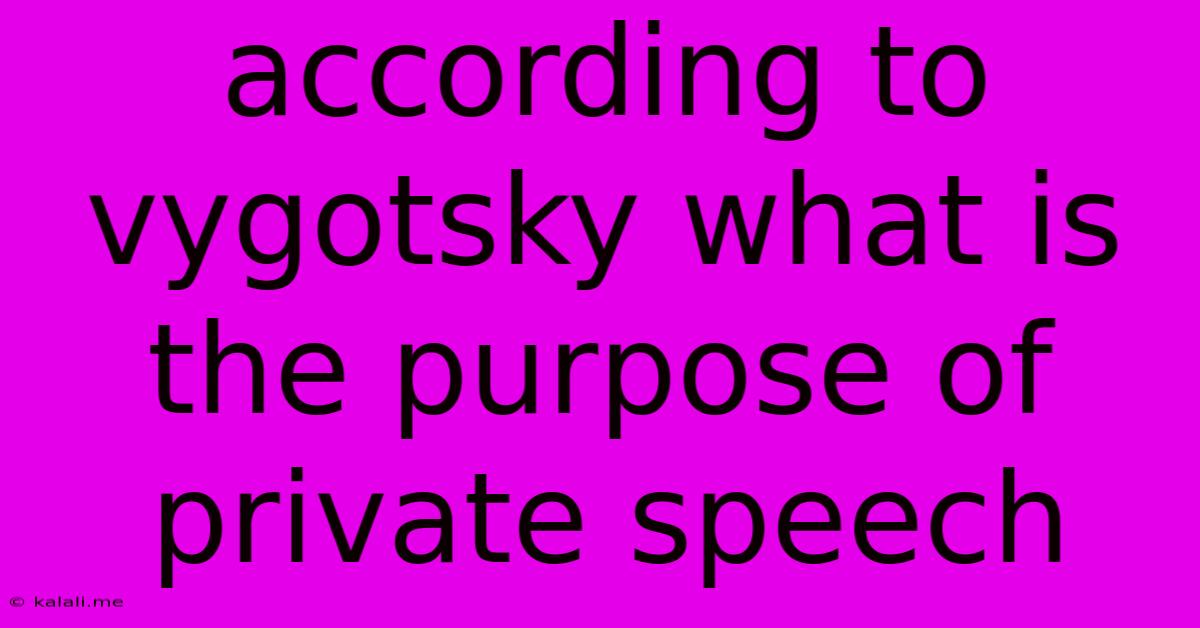According To Vygotsky What Is The Purpose Of Private Speech
Kalali
Jun 14, 2025 · 3 min read

Table of Contents
The Purpose of Private Speech According to Vygotsky: A Deep Dive into Self-Regulation and Cognitive Development
Lev Vygotsky, a pioneering figure in developmental psychology, offered a compelling perspective on the seemingly nonsensical phenomenon of private speech – the self-directed talk children engage in. Contrary to earlier interpretations that viewed it as egocentric or immature language, Vygotsky proposed a far more nuanced and significant role for private speech in cognitive development. This article will delve into Vygotsky's theory, exploring the purpose of private speech and its implications for learning and self-regulation.
What is Private Speech? Simply put, private speech is the language children use when talking to themselves, often out loud but sometimes silently. This self-directed dialogue is commonly observed in preschool and early elementary school children, gradually transitioning to inner speech as children mature. Examples include narrating actions ("I'm building a tower!"), problem-solving ("Hmm, how can I fit this block here?"), or guiding behavior ("No, don't touch that").
Vygotsky's Sociocultural Theory and the Genesis of Private Speech: Vygotsky's sociocultural theory emphasizes the crucial role of social interaction in cognitive development. He argued that higher-level cognitive functions, including language and thought, originate in social interactions. Private speech, according to Vygotsky, is not a sign of immaturity but rather a crucial transitional phase between social speech and inner speech. It develops from social interactions, initially mirroring the conversations children have with others.
The Purpose of Private Speech: Self-Regulation and Problem-Solving: Vygotsky posited that the primary purpose of private speech is to regulate behavior and guide problem-solving. It's a tool children use to plan, monitor, and evaluate their actions. Children use private speech to:
- Guide their actions: They talk themselves through tasks, breaking down complex processes into smaller, manageable steps. This is particularly evident in challenging situations or when faced with unfamiliar tasks.
- Overcome obstacles: When confronted with difficulties, children often use private speech to verbalize their thoughts, analyze the problem, and strategize solutions. This self-directed dialogue helps them to organize their thinking and find effective approaches.
- Control impulses: Private speech can function as a self-regulatory mechanism, helping children manage their emotions and impulses. For example, a child might tell themselves, "I need to wait my turn," to control their frustration.
- Maintain focus and attention: Private speech can help children stay on task, particularly when engaging in activities requiring sustained attention and concentration. They might use self-instructions to remind themselves of the task's goals and monitor their progress.
The Transition to Inner Speech: As children mature, their private speech becomes less audible and eventually internalized as inner speech – the silent dialogue we use to think and plan. This internalization process reflects a significant cognitive advancement, enabling children to regulate their behavior and solve problems more efficiently without the need for overt verbalization. This inner speech becomes a powerful tool for self-regulation and cognitive control.
Empirical Support for Vygotsky's Theory: Numerous studies have supported Vygotsky's claims about the cognitive benefits of private speech. Research has shown a positive correlation between the frequency of private speech and problem-solving abilities, particularly in challenging situations. Children who use private speech more effectively tend to perform better on cognitive tasks requiring self-regulation and planning.
Implications for Education: Understanding the purpose of private speech has important implications for educational practices. Educators can foster cognitive development by creating learning environments that encourage self-directed learning, problem-solving, and self-regulation. Strategies such as providing opportunities for collaborative learning, scaffolding challenging tasks, and encouraging self-talk can support children's development of private speech and its transition to inner speech.
In conclusion, Vygotsky's perspective on private speech challenges simplistic notions of children's self-talk. It highlights the crucial role of private speech in cognitive development, emphasizing its contribution to self-regulation, problem-solving, and the eventual emergence of inner speech – a cornerstone of advanced cognitive functioning. By appreciating the significance of private speech, educators and caregivers can foster children's cognitive development more effectively.
Latest Posts
Latest Posts
-
Bureau Of Indian Standards Recruitment 2024
Jun 14, 2025
-
What Is The Jelly Like Substance In A Cell
Jun 14, 2025
-
Which Of The Following Is True Of Shaded Pole Motors
Jun 14, 2025
-
All Of The Following Are Examples Of Video Conferencing Systems Except
Jun 14, 2025
-
What Unit Is Used To Measure Wavelength
Jun 14, 2025
Related Post
Thank you for visiting our website which covers about According To Vygotsky What Is The Purpose Of Private Speech . We hope the information provided has been useful to you. Feel free to contact us if you have any questions or need further assistance. See you next time and don't miss to bookmark.